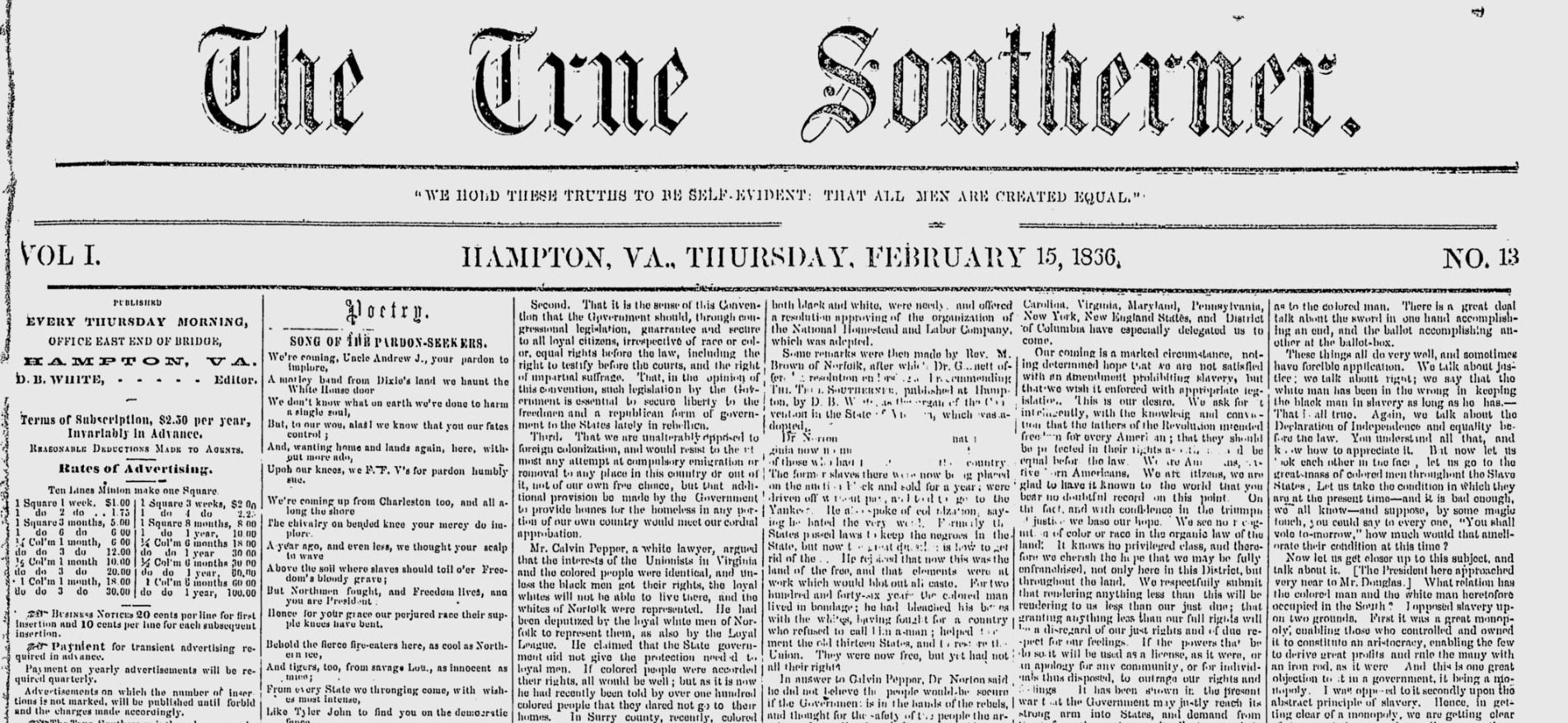The True Southerner on:
[Wikipedia]
[Google]
[Amazon]
 ''The True Southerner'' was a weekly newspaper published during the
''The True Southerner'' was a weekly newspaper published during the
Google newspaper archives
Weekly newspapers published in the United States 1866 disestablishments in Virginia Defunct African-American newspapers 1865 establishments in Virginia Defunct newspapers published in Virginia {{DEFAULTSORT:True Southerner
 ''The True Southerner'' was a weekly newspaper published during the
''The True Southerner'' was a weekly newspaper published during the Reconstruction era
The Reconstruction era was a period in American history following the American Civil War (1861–1865) and lasting until approximately the Compromise of 1877. During Reconstruction, attempts were made to rebuild the country after the bloo ...
after the American Civil War in Hampton, Virginia
Hampton () is an independent city (United States), independent city in the Commonwealth (U.S. state), Commonwealth of Virginia in the United States. As of the 2020 United States Census, 2020 census, the population was 137,148. It is the List ...
and then Norfolk, Virginia
Norfolk ( ) is an independent city in the Commonwealth of Virginia in the United States. Incorporated in 1705, it had a population of 238,005 at the 2020 census, making it the third-most populous city in Virginia after neighboring Virginia Be ...
. It advocated for the rights of African Americans and was the first African-American newspaper published in Virginia. Founded in 1865, the paper was moved to Norfolk early the next year, where Joseph T. Wilson
Joseph Thomas Wilson (September 25, 1891) was an American journalist, politician, and author. He served in several regiments, including the 54th Massachusetts Infantry Regiment, during the American Civil War. After the war's end, he was the publ ...
served as its editor. The paper's offices and press were destroyed by a white mob in early 1866, and it ceased publication shortly thereafter.
History
''The True Southerner'' was the first African-American newspaper published in Virginia upon its foundation in March or November 1865, inHampton, Virginia
Hampton () is an independent city (United States), independent city in the Commonwealth (U.S. state), Commonwealth of Virginia in the United States. As of the 2020 United States Census, 2020 census, the population was 137,148. It is the List ...
, by D. B. White. The first issue was published November 24, 1865. Publication continued until mid-April 1866.'''' The paper was not initially financially successful. It was sponsored by the Union League and in Hampton vocally criticized a white mob that seriously injured several Black people. Civil War veteran Joseph T. Wilson
Joseph Thomas Wilson (September 25, 1891) was an American journalist, politician, and author. He served in several regiments, including the 54th Massachusetts Infantry Regiment, during the American Civil War. After the war's end, he was the publ ...
became its editor in early 1866, and may have taken over the paper; sources conflict over whether Wilson or White led its move to Norfolk, Virginia
Norfolk ( ) is an independent city in the Commonwealth of Virginia in the United States. Incorporated in 1705, it had a population of 238,005 at the 2020 census, making it the third-most populous city in Virginia after neighboring Virginia Be ...
, in February 1866, seeking a market where the paper might be more financially successful.
The paper defended Calvin Pepper, a lawyer representing the Loyal League of Virginia. It also published a column by "Anna" titled "To the Freed Women" about the status of women, particularly women of color, and inequalities. As editor, Wilson vocally criticized Andrew Johnson
Andrew Johnson (December 29, 1808July 31, 1875) was the 17th president of the United States, serving from 1865 to 1869. He assumed the presidency as he was vice president at the time of the assassination of Abraham Lincoln. Johnson was a Dem ...
's decision to veto creation of the Freedmen's Bureau
The Bureau of Refugees, Freedmen, and Abandoned Lands, usually referred to as simply the Freedmen's Bureau, was an agency of early Reconstruction, assisting freedmen in the South. It was established on March 3, 1865, and operated briefly as a ...
and the Civil Rights Act of 1866
The Civil Rights Act of 1866 (, enacted April 9, 1866, reenacted 1870) was the first United States federal law to define citizenship and affirm that all citizens are equally protected by the law. It was mainly intended, in the wake of the Amer ...
. He also used the paper to advocate for giving Black men the right to vote. These actions angered some living in Norfolk, and just two months after the move the paper's press was destroyed by a mob. This was just one of many such attacks around the nation during the Reconstruction era.
The Library of Virginia has issues of the paper on microfilm and online.
References
External links
Google newspaper archives
Weekly newspapers published in the United States 1866 disestablishments in Virginia Defunct African-American newspapers 1865 establishments in Virginia Defunct newspapers published in Virginia {{DEFAULTSORT:True Southerner